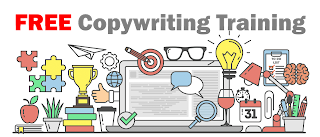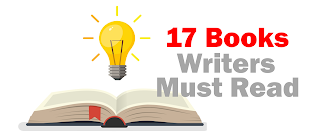I could easily come up with 50 books to recommend for writers who want to improve their craft, but I've boiled it down to 17.
It's painful to leave some incredibly good ones off this list. But 50 is an intimidating number. A big number to commit to ... and a long enough list to make it difficult to know where to start.
But 17 is a reasonable number. A number you can see yourself reading over the next year or so.
So pick a book off this list today.
Just one.
Start reading it as soon as you get your hands on it. Not only will you enjoy it, but you will also be a better writer for it.
And you'll be inspired to pick another one.
The first 9 are for writers. The type of writing they want to specialize in doesn't matter ... fact ... fiction ... marketing. I believe every writer can benefit by spending some time with these books.
- Everybody Writes – Ann Handley
“Good writing serves the reader, not the writer. It isn't
self-indulgent. Good writing anticipates the questions that readers might have
as they're reading a piece, and it answers them.”
NOTE: Any edition is worth your time, but the latest was published in October 2022
- On Writing Well – William Zinsser
“Look for the clutter in your writing and prune it
ruthlessly. Be grateful for everything you can throw away. Reexamine each
sentence you put on paper. Is every word doing new work? Can any thought be
expressed with more economy?”
- Bird by Bird – Anne Lamott
“If you are a writer, or want to be a writer, this is how
you spend your days--listening, observing, storing things away, making your
isolation pay off. You take home all you've taken in, all that you've
overheard, and you turn it into gold. (Or at least you try.)”
- Wired for Story – Lisa Cron
“Story, as it turns out, was crucial to our evolution—more
so than opposable thumbs. Opposable thumbs let us hang on; story told us what
to hang on to.”
- On Writing – Stephen King
“If you want to be a writer, you must do two things above
all others: read a lot and write a lot. There's no way around these two things
that I'm aware of, no shortcut.”
- How to Write Clearly – Tom Albrighton
“Whatever new information you give your reader, it has to
fit with their existing knowledge, or it will be harder for them to understand.
At the same time, you don’t want to waste their time by telling them too many
things they already know.”
- You Are a Writer – Jeff Goins
“But beyond that, really, stop trying to be good. People’s
definitions of “good” vary. What one person loves, another hates. So stop
obsessing over being a good writer. It doesn’t matter. Too many writers are
caught up with insecure thoughts of whether they are any good. It’s crazy.
Enough with this neurotic behavior. Time to be confident in your craft.”
- The War of Art – Steven Pressfield
“If you find yourself asking yourself (and your friends), ‘Am
I really a writer? Am I really an artist?’ chances are you are. The counterfeit
innovator is wildly self-confident. The real one is scared to death.”
NOTE: Turning Pro is Pressfield's follow up to The War of Art. It's focused on the transition from amateur to professional.
- The Elements of Style – William Strunk & E.B. White
“A sentence should contain no unnecessary words, a paragraph
no unnecessary sentences, for the same reason that a drawing should have no
unnecessary lines and a machine no unnecessary parts.”
NOTE: The 4th edition (2000) is the latest edition.
For marketing writers, here are another 8 to be added to the list above. Not to replace the list, but to add to it.
- Ogilvy on Advertising – David Ogilvy
“Big ideas come from the unconscious. This is true in art,
in science and in advertising. But your unconscious has to be well informed, or
your idea will be irrelevant. Stuff your conscious mind with information, then
unhook your rational thought process.”
- The Copywriter’s Handbook – Bob Bly
“Instead of creating aesthetically pleasing prose, you have
to dig into a product or service, uncover the reasons why consumers would want
to buy the product, and present those sales arguments in copy that is read,
understood, and reacted to—copy that makes the arguments so convincingly the
customer can’t help but want to buy the product being advertised.”
NOTE: The most recent edition is the 4th from 2020.
- Influence – Robert Cialdini
“The idea of potential loss plays a large role in human
decision making. In fact, people seem to be more motivated by the thought of
losing something than by the thought of gaining something of equal value.”
NOTE: Originally written in 1984 there have been a number of updates with the latest being May 2021.
- The Adweek Copywriting Handbook – Joe Sugarman
“So your first sentence should be very compelling by virtue
of its short length and ease of reading. No long multisyllabic words. Keep it
short, sweet and almost incomplete so that the reader has to read the next
sentence.”
- Cashvertising – Drew Eric Whitman
“Listen: Your goal is not to create new fears, but to tap
into existing fears, either those on the forefront of consumers’ minds, or
those that require a little digging to uncover.”
The Ultimate Sales Letter – Dan Kennedy
"The
goal is understanding. To persuade someone, to motivate someone, to sell
someone, you really need to understand that person."
NOTE: The 4th edition from 2011 is the latest version.
- Commonsense Direct & Digital Marketing – Drayton
Bird
“Once you’ve worked out what benefit you deliver better than
others write it down in plain language everyone understands. Then think how you
can convey it in a way that’s hard to forget. Prove it’s true, with examples.
Then hammer it home, repeatedly.”
NOTE: This book can be difficult to find. If you can't get your hands on a copy, here's a replacement (not for the book itself, but to keep this list at 17): A Self-Help Guide for Copywriters – Dan Nelken "You have to think before you write because great headlines aren't great sentences – they're great ideas expressed in words. Remember, you're a creative first and writer second."
- Copywriting Made Simple – Tom Albrighton
“Copywriting is like a bridge. On one side is the person who
will read your copy. On the other side is you, along with whatever you’re
selling. Your job is to get the reader to cross the bridge and give it a try.”
I should've made this an even 18 by adding: Instant Inspiration for Copywriters –
Scott Frothingham ... but I'm trying to be humble.
A Final Note
Don't just read books on writing. Read novels and essays and poetry and short stories. Immersing yourself in good writing is one of the best things you can do to become a better writer.
For some books (not about writing) that I think are worthy of your time, check out: 12 Books (not about writing) Writers Should Read.
__________________________________
For some thoughts from famous authors about reading to improve your writing,









